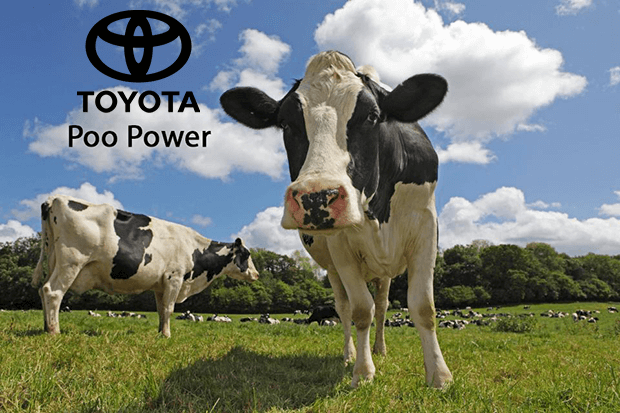Toyota will power hydrogen and electric cars by cow dung from 2020

Toyota is to build a renewable power plant in California where it will turn cow manure into water, which, in generate electricity and hydrogen to power homes and cars
The cow poo could be the answer to all our pollution problems as companies like Toyota will use it to power hydrogen and electric cars.
Manure collected from dairy farms and methane gas can be captured to generate water, electricity and hydrogen by 2020.
Current scientific consensus is that cows are a major pollutant, excreting huge amounts of CO2 into the atmosphere but Toyota will now put that waste to use at its Tri-Gen plant in California where it's testing a zero-emissions hydrogen truck that'll take on Tesla.
The cow poo plant is expected to generate 2.35 megawatts of electricity and 1.2 tons of hydrogen per day.
That'll be enough to power 1,500 cars and over 2,000 family homes.
It will be the world's first renewable plant on such a scale.
Toyota North America’s group vice president for strategic planning, Doug Murtha, said:
“For more than 20 years, Toyota has been leading the development of fuel cell technology, because we understand the tremendous potential (it has) to reduce emissions and improve society.
"Tri-Gen is a major step forward for sustainable mobility and a key accomplishment of our 2050 Environmental Challenge to achieve net zero CO2 emissions from our operations."
This particular renewable energy fuel will help power the Toyota Mirai in the United States.
But there are a couple of drawbacks at the moment to this fuel source— even though Hydrogen is the most abundant element in the universe, commercial Hydrogen is created as a by-product from the fossil fuel refining industry.
And there are limited Hydrogen fuelling stations — only around four in the UK and none as yet in Ireland.
Hydrogen offers similar refuelling speeds to a regular petrol or diesel - plus the same sort of range per tank.
At the moment the technology is much more expensive but some experts believe it could be the long term answer to meet pollution targets.

Author

Justin Kavanagh
Justin Kavanagh is a recognised leader
in automotive intelligence and vehicle
data supply to the entire motor industry.
He has almost 20 years experience in
building systems from the ground up.
As the Managing Director of Vehicle
Management System, he understands the
need and importance of trustworthy and
reliable vehicle history and advice to
both the trade and the public.
Follow me on LinkedIn